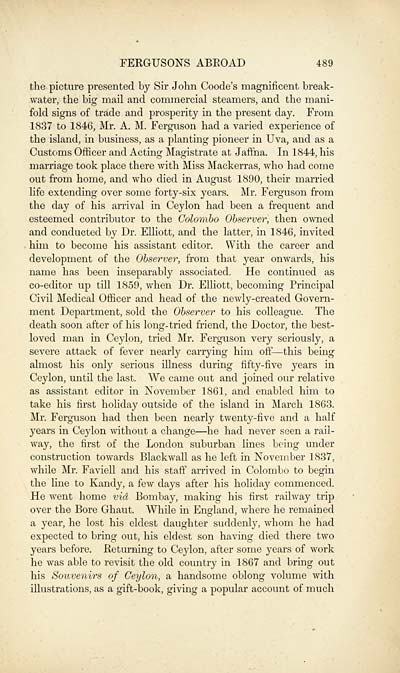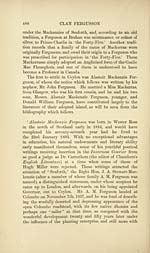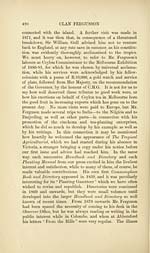Download files
Complete book:
Individual page:
Thumbnail gallery: Grid view | List view

FERGUSONS ABROAD 489
the picture presented by Sir John Coode's magnificent break-
water, the big mail and commercial steamers, and the mani-
fold signs of trade and prosperity in the present day. From
1837 to 1846, Mr. A. M. Ferguson had a varied experience of
the island, in business, as a planting pioneer in Uva, and as a
Customs Officer and Acting Magistrate at Jaffna. In 1844, his
marriage took place there with Miss Mackerras, who had come
out from home, and who died in August 1890, their married
life extending over some forty-six years. Mr. Ferguson from
the day of his arrival in Ceylon had been a frequent and
esteemed contributor to the Colombo Observer, then owned
and conducted by Dr. Elliott, and the latter, in 1846, invited
him to become his assistant editor. With the career and
development of the Observer, from that year onwards, his
name has been inseparably associated. He continued as
co-editor up till 1859, when Dr. Elliott, becoming Principal
Civil Medical Officer and head of the newly-created Govern-
ment Department, sold the Observer to his colleague. The
death soon after of his long- tried friend, the Doctor, the best-
loved man in Ceylon, tried Mr. Ferguson very seriously, a
severe attack of fever nearly carrying him off — this being
almost his only serious illness during fifty-five years in
Ceylon, until the last. We came out and joined our relative
as assistant editor in November 1861, and enabled him to
take his first holiday outside of the island in March 1863.
Mr. Ferguson had then been nearly twenty-five and a half
years in Ceylon without a change — he had never seen a rail-
way, the first of the London suburban lines being under
construction towards Blackwall as he left in November 1837,
while Mr. Faviell and his staff arrived in Colombo to begin
the line to Kandy, a few days after his holiday commenced.
He went home vid Bombay, making his first railway trip
over the Bore Ghaut. While in England, where he remained
a year, he lost his eldest daughter suddenly, whom he had
expected to bring out, his eldest son having died there two
years before. Returning to Ceylon, after some years of work
he was able to revisit the old country in 1867 and bring out
his Souvenirs of Ceylon, a handsome oblong volume with
illustrations, as a gift-book, giving a popular account of much
the picture presented by Sir John Coode's magnificent break-
water, the big mail and commercial steamers, and the mani-
fold signs of trade and prosperity in the present day. From
1837 to 1846, Mr. A. M. Ferguson had a varied experience of
the island, in business, as a planting pioneer in Uva, and as a
Customs Officer and Acting Magistrate at Jaffna. In 1844, his
marriage took place there with Miss Mackerras, who had come
out from home, and who died in August 1890, their married
life extending over some forty-six years. Mr. Ferguson from
the day of his arrival in Ceylon had been a frequent and
esteemed contributor to the Colombo Observer, then owned
and conducted by Dr. Elliott, and the latter, in 1846, invited
him to become his assistant editor. With the career and
development of the Observer, from that year onwards, his
name has been inseparably associated. He continued as
co-editor up till 1859, when Dr. Elliott, becoming Principal
Civil Medical Officer and head of the newly-created Govern-
ment Department, sold the Observer to his colleague. The
death soon after of his long- tried friend, the Doctor, the best-
loved man in Ceylon, tried Mr. Ferguson very seriously, a
severe attack of fever nearly carrying him off — this being
almost his only serious illness during fifty-five years in
Ceylon, until the last. We came out and joined our relative
as assistant editor in November 1861, and enabled him to
take his first holiday outside of the island in March 1863.
Mr. Ferguson had then been nearly twenty-five and a half
years in Ceylon without a change — he had never seen a rail-
way, the first of the London suburban lines being under
construction towards Blackwall as he left in November 1837,
while Mr. Faviell and his staff arrived in Colombo to begin
the line to Kandy, a few days after his holiday commenced.
He went home vid Bombay, making his first railway trip
over the Bore Ghaut. While in England, where he remained
a year, he lost his eldest daughter suddenly, whom he had
expected to bring out, his eldest son having died there two
years before. Returning to Ceylon, after some years of work
he was able to revisit the old country in 1867 and bring out
his Souvenirs of Ceylon, a handsome oblong volume with
illustrations, as a gift-book, giving a popular account of much
Set display mode to:
![]() Universal Viewer |
Universal Viewer | ![]() Mirador |
Large image | Transcription
Mirador |
Large image | Transcription
Images and transcriptions on this page, including medium image downloads, may be used under the Creative Commons Attribution 4.0 International Licence unless otherwise stated. ![]()
| Histories of Scottish families > Records of the clan and name of Fergusson, Ferguson and Fergus > (543) Page 489 |
|---|
| Permanent URL | https://digital.nls.uk/95332679 |
|---|
| Description | A selection of almost 400 printed items relating to the history of Scottish families, mostly dating from the 19th and early 20th centuries. Includes memoirs, genealogies and clan histories, with a few produced by emigrant families. The earliest family history goes back to AD 916. |
|---|

